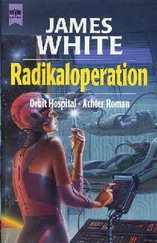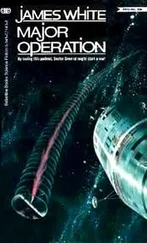“My previous experience had been with short-term patients who showed no surprise at their awakening being supervised by a robot,” the Sister broke in. “And Dr. Pellew had promised to issue instructions regarding the six long-term patients, but he died before doing so. There are three possible reasons for his neglecting to do so: that he did not know what instructions to give; that he intended living through until the first patient was due and awakening him personally, because he had stated several times to me that he was a very lonely man; or that he knew what orders to give but simply forgot to give them, he being very old at that time and tending to forget things…”
“He wasn’t doddering,” said Ross angrily. “I’ve read his diary I know,”
“…But we had definite instructions to awaken these patients,” the Sister continued, as if he hadn’t spoken, “and had therefore no choice but to do so. This despite the fact that our basic function is to serve man and save men’s lives. We kept reviving the patients in the hope that some of them would survive the process, but none did. Then we came to you and were faced with a dilemma.
“To a robot,” it went on, “allowing a human to remain in Deep Sleep forever is the same as allowing him to die, and bringing one out of Deep Sleep was the same as killing him. And if we killed you, who were the last man, we would both fail in our purpose of saving human lives and at the same time remove our other reason for existence. We could not serve Man if there were no human beings left. That was why, when we commenced revivication on you and you began to display the same symptoms of increasing mental distress and violent muscular activity as had the others, I halted the process and returned you to Deep Sleep. In this I exceeded my instructions, but it seemed the only way possible at the time of not killing you…”
The Ward Sister became technical at that point as it went into details of conferences with various repair robots. As the most intelligent single robot in the hospital — the last modification produced by the great cyberneticist Courtland — the responsibility for solving the dilemma naturally fell on it. Its purpose in going to the repair robots was to have them try various modifications and extensions of its memory banks in the hope of emulating the creative or intuitive thinking used by humans in order to solve the problem. Whether the resultant modifications helped or not the Ward Sister had no way of knowing, but after several months and another halted revivication had passed, a new method of attacking the problem suggested itself…
’For a successful awakening I needed at least one human being in attendance,” the robot continued in its brisk, feminine voice, “and by breaking down the function of the human during such a time into separate parts, converting the large problem into several small ones, I arrived at the solution. The human had to be seen, heard and had to assist the patient physically to do some gentle exercise. I knew of one of Dr. Pellew’s ornaments which resembled a human being, and could be painted to increase that resemblance. I had access to tapes containing Dr. Pellew’s voice, which were edited to fit the situation, and the exercise was provided by causing you to go into the corridor for your file, which also began the process of reorientation. It remained only for us to keep out of sight until you understood what had happened while you were in Deep Sleep, which was supposed to be after your reading of Dr. Pellew’s diary. Instead, you ordered us to come out—”
“You’ve done very well,” said Ross heavily. “Mr. Courtland would be proud of you.”
“Thank you, sir.”
“But you shouldn’t have bothered.”
The Sister began ticking at him.
Ross turned suddenly and strode out of the room, along the corridor and up the sloping ramp until he came to a compartment with maintenance on the door. With the Sister trailing a few yards behind, he entered and began searching the tool lockers until he found a long-handled wrench, which weighed about eight pounds and was over two feet long.
“I want you to do something for me,” Ross said in a mild voice. “I want you to stand still.” Then he swung the wrench against the robot’s smooth metal casing with all his strength.
The blow landed with a shock which jarred him to his heels and a crash which was the loudest noise he had heard since awakening. It battered in one of the flush panels, bludgeoning through the mass of delicate surgical and medical gadgetry underneath. From the wound multicolored blood spurted as underlying drug containers shattered, and three syringes on extensible arms sprang out and sagged downward. Ross swung again.
The second blow caused only a shallow dent, because the robot had moved away, and the third one missed entirely.
“Stand still!” said Ross thickly, raising his metal club again and aiming for the robot’s lenses. One of those last five patients had been a nineteen-year-old girl. An eye for an eye, he thought with a cold ferocity, and for a girl’s life a dead mass of scrap iron …
“Mr. Ross,” said the robot, retreating again, “you are not behaving in a sane—”
“This is a scientific experiment,” said Ross, a little breathlessly, “to determine whether or not you can feel pain. And I am not a patient, so call me ‘sir.’ ”
That was important, Ross told himself. If he gave good, logical reasons for wanting to smash it into its component nuts and bolts, he might get away with it — he would still be the boss. But once let it start thinking of him as a patient and then it would be the boss. He advanced again, silent and blank-faced, trying to hide his killing rage behind a facade of scientific curiosity. He had the Sister in a corner now.
One of the robot’s body panels opened briefly. Ross did not see or feel or smell anything. His wrench hit the floor an instant before he did, and he didn’t feel that because by that time he was asleep.
When Ross came to there was a big, multijointed angular object resembling a surrealistic spider working on the Ward Sister. Several of its panels had been detached, revealing a considerable amount of internal circuitry, and the overall effect seemed vaguely indecent to Ross. The Sister spoke first:
“The data which you required could have been obtained by a verbal request,” it said in the brisk, pleasant voice it always used no matter what the circumstances, “so that your experiment, which has caused me a temporary loss of efficiency, was unnecessary. I do not feel pain, or pleasure, in the manner of a human being although I am trained to observe and treat its symptoms in patients. Primarily I have been built to serve Man and anything which hinders my doing so causes me a robot equivalent of pain and anything which aids me toward that end is a form of pleasure. To expand that, pleasure lies in working as hard as possible at the direction of human beings, maintaining myself at peak efficiency to further that end, and avoiding all situations likely to bring about a loss of efficiency when such avoidance will not endanger a human.”
“So you got a kick out of knocking me over just now?” Ross said woozily. “An anesthetic gas, wasn’t it.”
“Yes, sir.”
Ross shook his head. He was beginning to feel ashamed of his recent berserker rage — especially as it had been such a dishonest, camouflaged sort of rage — against this machine, which had, after all, been doing its best. He felt that he should apologize to the Sister, except that apologizing to a machine struck him as being ridiculous.
Awkwardly, he said, “Then I hurt you by causing a temporary loss of efficiency, and by defending yourself against a possible permanent loss of efficiency you gained pleasure. That makes us even.”
Читать дальше












